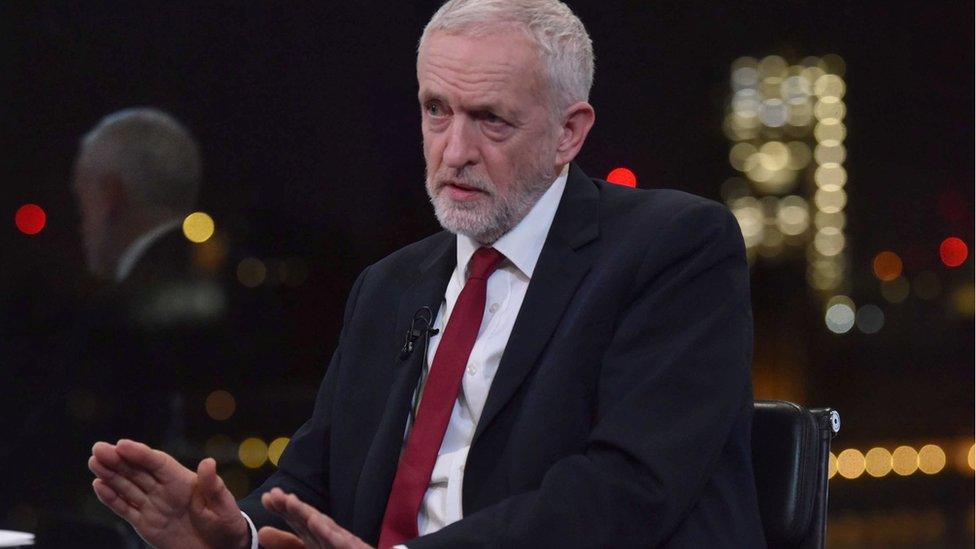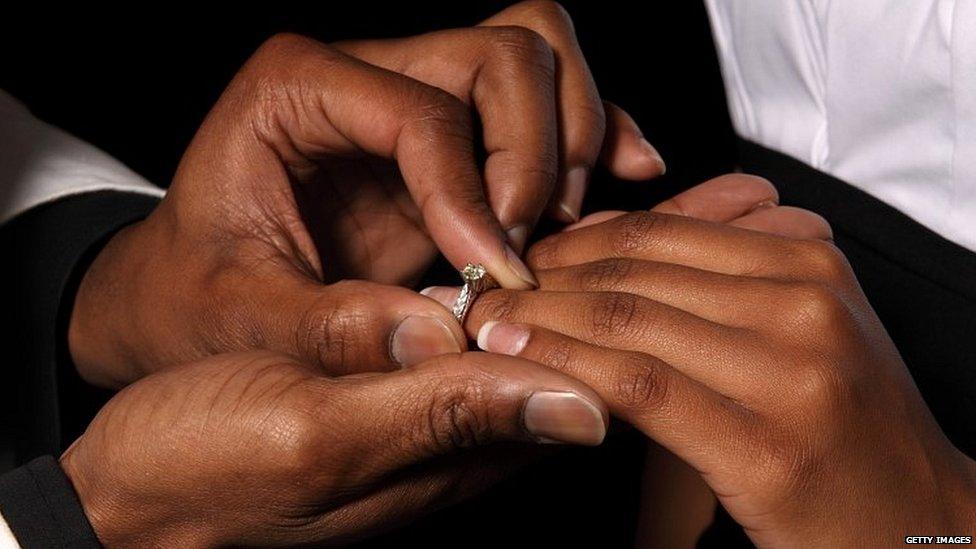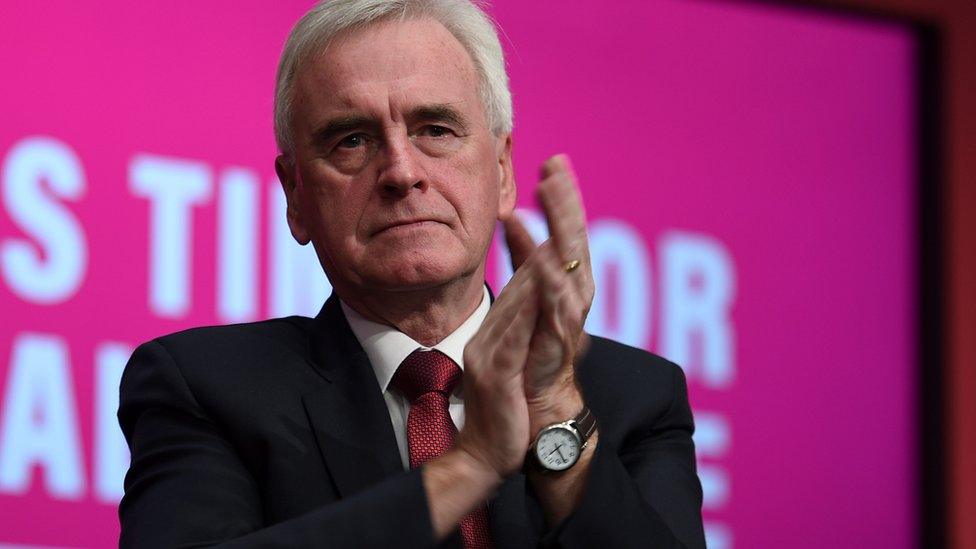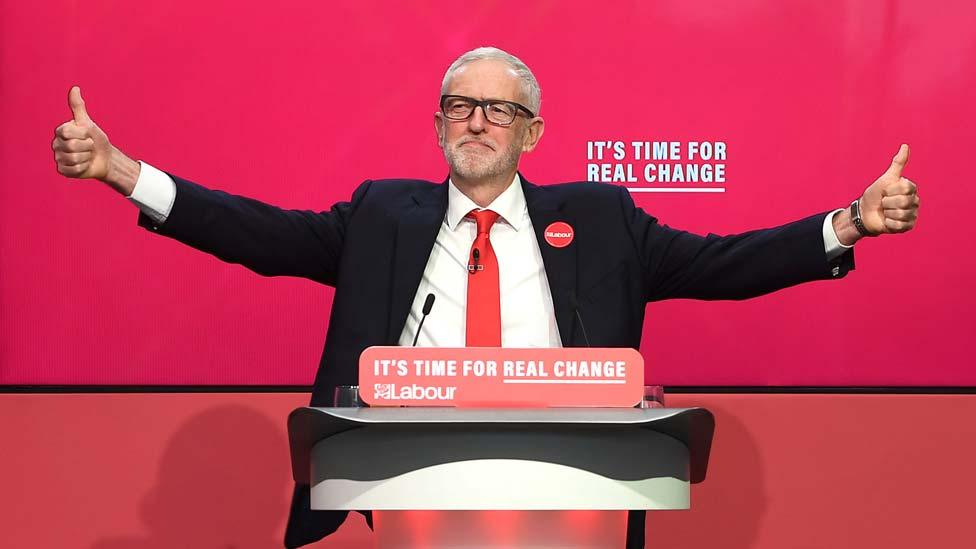General election 2019: Corbyn concedes lower earners could pay more tax
- Published

Jeremy Corbyn has admitted some of those on lower incomes could pay more tax under a future Labour government.
The Labour leader had previously insisted only the richest 5% of taxpayers, those earning about £80,000 a year or more, would face tax rises.
But he was forced to concede a plan to scrap a tax break for married couples would impact those earning less.
Mr Corbyn argued in a BBC interview that those affected would benefit from a higher living wage.
"They will also be getting improvement in free nursery provision for two to four-year-olds," he added.
Challenged on the policy in an interview with Andrew Neil on Tuesday night, Mr Corbyn conceded couples in receipt of the marriage allowance would no longer receive a reduction in tax if he wins power next month.
"They won't get the advantage, it's actually taking away £250," he said.
The tax break was brought in by David Cameron in 2015 to promote marriage, with stay-at-home mothers and women who work part-time expected to be the main winners.
It is available to married couples and civil partners with a combined income of under £62,500 in England, Wales and Northern Ireland, and up to £43,430 in Scotland.

What is the marriage allowance?

The marriage allowance, external is a tax relief for married couples and civil partners that allows one partner to transfer part of their personal allowance to the other.
To benefit as a couple, the lower earner must normally have an income below their personal allowance, which is usually £12,500.
It reduces the couple's tax bill by up to £250 a year.

In the year to April 2019, 1.78 million people claimed the tax break, out of the 4.2 million couples eligible to receive it.
When Labour published its general election manifesto last week it said there would be no increases in VAT, income tax or national insurance for 95% of taxpayers - those earning less than £80,000 - if it wins power on 12 December.
The party is insisting that that is still the case and only a "limited" number of those on low incomes would be affected.
Scrapping the marriage allowance was not in Labour's manifesto, but was included in an accompanying document, the so-called grey book, external, setting out how the party plans to pay for its spending commitments.
In the interview with Andrew Neil, Mr Corbyn repeated that only people who earned more than £80,000 a year would see a tax increase.
He said scrapping the marriage allowance would be a "step towards equality" because "those people that are cohabiting in a very happy family atmosphere and bringing up children do not get the benefit of that".
Defending the move, Shadow Justice Secretary Richard Burgon said married and unmarried couples facing "tough times" would see their "income boosted" in other ways.
He told BBC Radio 4's Today programme that people who had received the tax allowance would benefit from Labour's plan for 30 hours of free childcare for all two-to-four year olds and a £10 minimum wage.
Jeremy Corbyn says restoring Waspi pensions would be be paid for from government reserves and long-term borrowing.
Asked if the move amounted to a tax rise, he said: "That allowance is going away but it is more than made up for in the extra resources they will be getting."
Tuesday evening's half-hour interview with Andrew Neil, who is also speaking to other party leaders during the election, also saw Mr Corbyn struggle to explain how Labour's pledge to restore pensions to women born in the 1950s would be paid.
The policy's estimated £58bn cost over five years would be paid for through government reserves and, if necessary, borrowing, "over some years".
He conceded that there were not sufficient funds in the government's reserves to cover the bill, but insisted the women deserved to be repaid.
Mr Corbyn also declined to apologise to the UK Jewish community after the Chief Rabbi Ephraim Mirvis claimed the "poison" of anti-Semitism within Labour was "sanctioned from the very top".
Defending his leader's performance, Mr Burgon said Mr Corbyn had already apologised for the "hurt caused" to many Jewish people (in 2018).
He said compensating the Waspi women was entirely justified - suggesting money had effectively been stolen from them.
"This amounts to theft and robbery of money these women paid into (their pension schemes) and money that they are entitled to," he said.
The Conservatives said Labour was not able to answer how it would pay for their "fantasy plans for the country", which risked taxpayers "footing the bill".

CONFUSED? Our simple election guide, external
POLICY GUIDE: Who should I vote for?, external

- Published22 November 2019

- Published22 November 2019
